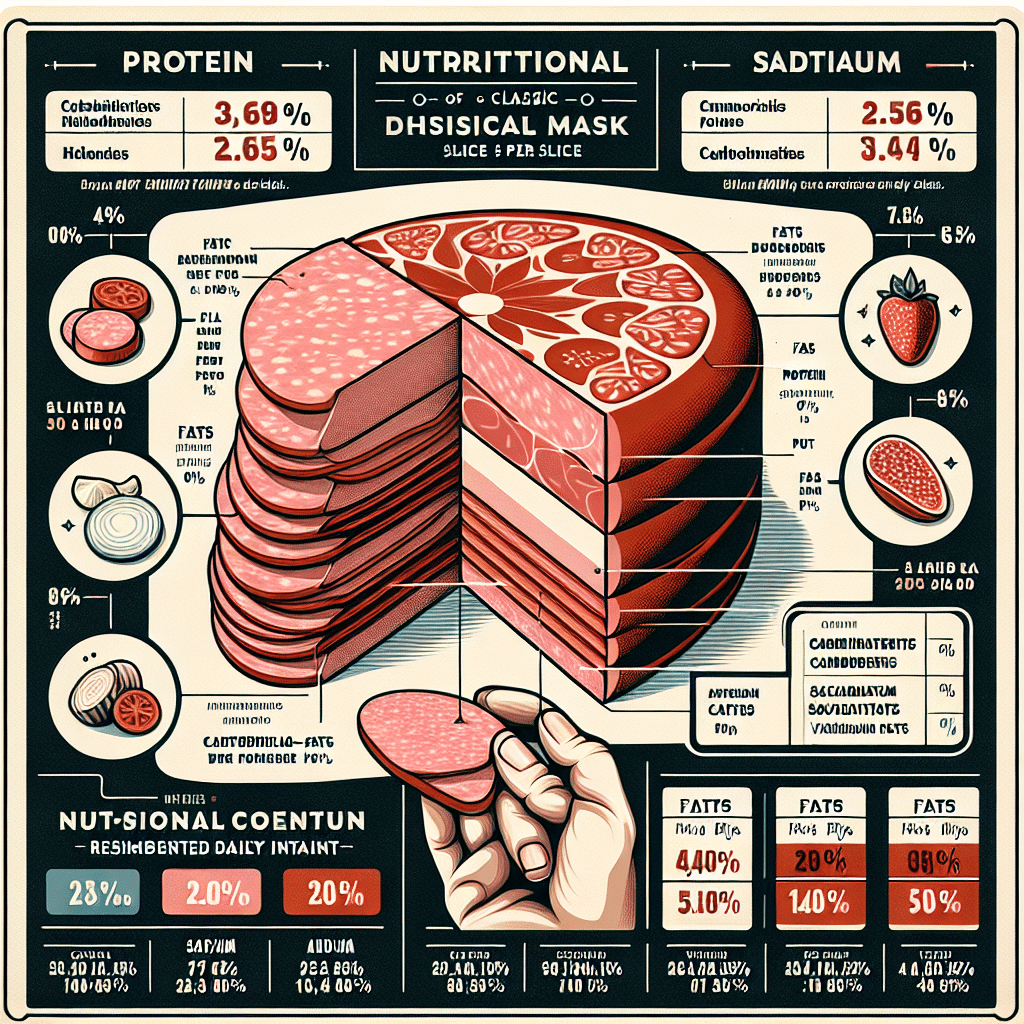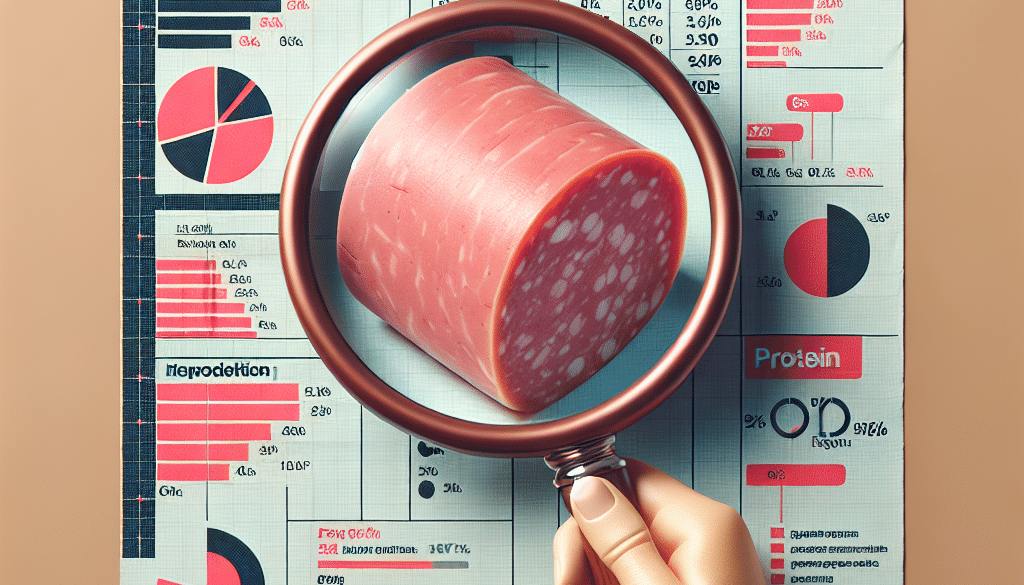Protein in Bologna: Nutritional Value of This Classic Deli Meat
-
Table of Contents
- Protein in Bologna: Assessing the Nutritional Profile of Classic Deli Meat
- Understanding Bologna: A Brief Overview
- The Nutritional Breakdown of Bologna
- Protein Quality in Bologna
- Health Implications of Consuming Bologna
- Incorporating Bologna into a Balanced Diet
- Alternatives to Bologna for Protein Intake
- Conclusion: The Role of Bologna in Your Diet
- Discover ETprotein’s High-Quality Protein Products
Protein in Bologna: Assessing the Nutritional Profile of Classic Deli Meat

Bologna, a staple in sandwiches and charcuterie boards, is a type of processed meat that has been enjoyed for generations. While it’s often associated with quick, inexpensive lunches, the nutritional value of bologna, particularly its protein content, is a topic worth exploring. In this article, we delve into the nutritional landscape of bologna, examining its protein quality, health implications, and how it fits into a balanced diet.
Understanding Bologna: A Brief Overview
Bologna is a type of cooked, smoked sausage made from cured beef, pork, or a mixture of the two. It originated in Bologna, Italy, and has since become a popular deli meat around the world. The American version of bologna is similar to the Italian mortadella, although it typically has a finer texture and is less spicy.
The Nutritional Breakdown of Bologna
When assessing the nutritional value of bologna, it’s important to consider its macronutrient composition, particularly its protein content. Here’s a general breakdown of what you can expect from a typical serving of bologna:
- Calories: A slice of bologna (approximately 28 grams) contains around 90 calories.
- Protein: Bologna is relatively high in protein, with a single slice providing about 3 to 4 grams.
- Fat: It is also high in fat, with around 7 to 8 grams per slice, of which 2 to 3 grams are saturated.
- Carbohydrates: Bologna is low in carbs, often containing less than 1 gram per slice.
- Vitamins and Minerals: Bologna provides certain nutrients such as vitamin B12, zinc, and iron, but the amounts can vary based on the ingredients and processing methods.
Protein Quality in Bologna
While bologna does contain protein, it’s essential to consider the quality of this protein. Animal-based proteins like those found in bologna are complete proteins, meaning they contain all nine essential amino acids required by the body. However, the processing of bologna can affect the integrity of these proteins to some extent.
Moreover, the presence of other ingredients, such as preservatives and fillers, can impact the overall healthfulness of the protein in bologna. It’s also worth noting that processed meats, including bologna, have been linked to certain health risks when consumed in excess.
Health Implications of Consuming Bologna
Processed meats like bologna have been the subject of numerous health studies. The World Health Organization has classified processed meats as Group 1 carcinogens, indicating that there is sufficient evidence that they can cause cancer, particularly colorectal cancer. This classification is based on the presence of compounds such as nitrates and nitrites, which are used in curing meats and can form potentially carcinogenic N-nitroso compounds.
Additionally, the high fat and sodium content in bologna can contribute to other health issues, such as heart disease and high blood pressure. It’s important for consumers to be mindful of these risks and to consume bologna in moderation as part of a varied and balanced diet.
Incorporating Bologna into a Balanced Diet
While bologna is not the healthiest protein option available, it can be included in a balanced diet with some considerations:
- Portion Control: Limiting the amount of bologna consumed at one time can help manage calorie and fat intake.
- Frequency: Enjoying bologna occasionally rather than daily can reduce exposure to potentially harmful compounds.
- Pairing: Combining bologna with healthier foods, such as whole grains, vegetables, and fruits, can enhance the overall nutritional value of the meal.
- Choosing Healthier Variants: Opting for bologna made with lower sodium and without added nitrates or nitrites can be a better choice.
Alternatives to Bologna for Protein Intake
For those looking to diversify their protein sources or seeking healthier alternatives to bologna, there are numerous options:
- Lean Meats: Turkey, chicken, and lean cuts of beef or pork provide high-quality protein with less fat.
- Plant-Based Proteins: Beans, lentils, tofu, and tempeh are excellent sources of protein and are associated with various health benefits.
- Dairy and Eggs: Low-fat dairy products and eggs offer protein along with other essential nutrients.
- Seafood: Fish and shellfish provide protein and are rich in omega-3 fatty acids, which are beneficial for heart health.
Conclusion: The Role of Bologna in Your Diet
Bologna can be a convenient source of protein, but it’s important to consider its place within a nutritious and balanced diet. Due to its processed nature and potential health risks, bologna should be consumed in moderation. By being mindful of portion sizes, frequency of consumption, and choosing healthier variants, individuals can enjoy bologna while maintaining a healthy lifestyle.
For those seeking alternative protein sources, exploring plant-based options or leaner meats can provide diversity in their diet while offering additional health benefits. As with any dietary choice, the key is balance and variety.
Discover ETprotein’s High-Quality Protein Products
If you’re looking for alternative protein sources, ETprotein offers a range of plant-based protein products that can be a great addition to your diet. Their selection includes organic rice protein, clear rice protein, pea protein, and more, all characterized by a neutral taste and non-GMO, allergen-free attributes. Whether you’re involved in the food and beverage industry or seeking personal health and wellness products, ETprotein has solutions to meet your protein needs.
About ETprotein:
ETprotein, a reputable plant protein vegan protein Chinese factory manufacturer and supplier, is renowned for producing, stocking, exporting, and delivering the highest quality organic bulk vegan protein and plant proteins. They include Organic rice protein, clear rice protein, pea protein, clear pea protein, watermelon seed protein, pumpkin seed protein, sunflower seed protein, mung bean protein, peanut protein etc. Their offerings, characterized by a neutral taste, non-GMO, allergen-free attributes, cater to a diverse range of industries. They serve nutraceutical, pharmaceutical, cosmeceutical, veterinary, as well as food and beverage finished product distributors, traders, and manufacturers across Europe, USA, Canada, Australia, Thailand, Japan, Korea, Brazil, and Chile, among others.
ETprotein specialization includes exporting and delivering tailor-made protein powder and finished nutritional supplements. Their extensive product range covers sectors like Food and Beverage, Sports Nutrition, Weight Management, Dietary Supplements, Health and Wellness Products, and Infant Formula, ensuring comprehensive solutions to meet all your protein needs.
As a trusted company by leading global food and beverage brands and Fortune 500 companies, ETprotein reinforces China’s reputation in the global arena. For more information or to sample their products, please contact them and email sales(at)ETprotein.com today.












